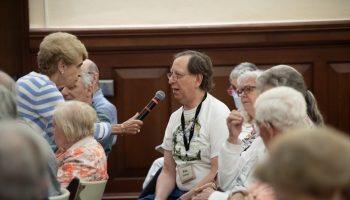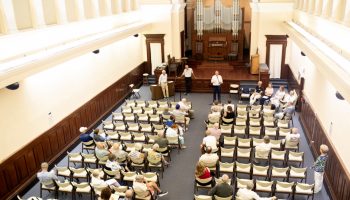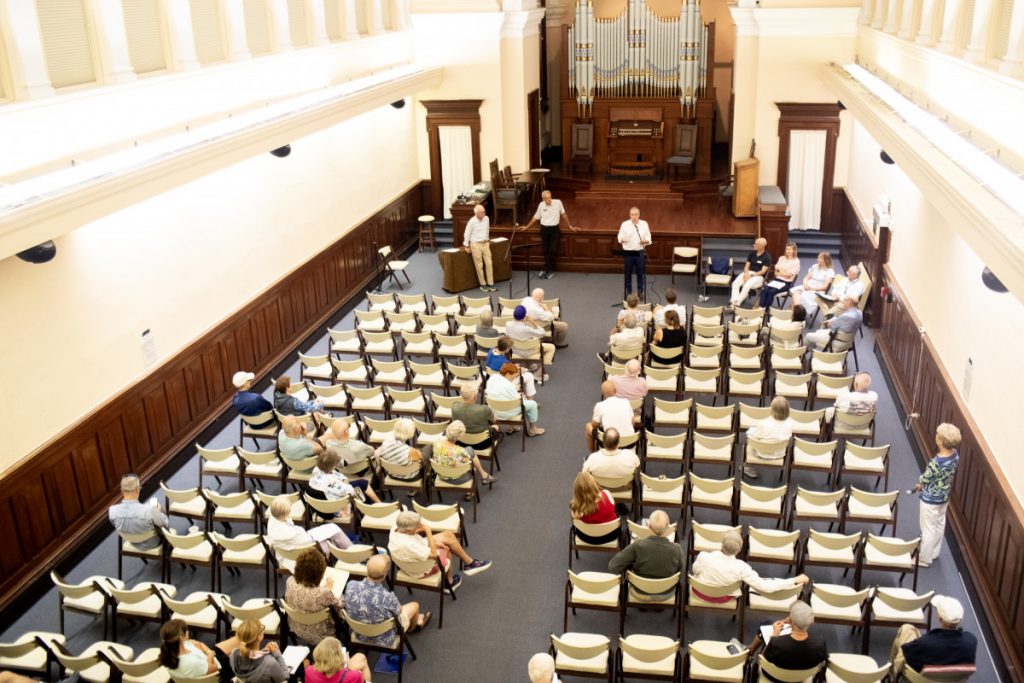
Cody Englander & Julia Weber
Staff Writers
Shortly after Interim Chief Executive Kyle Keogh announced in a July 28 webinar that the Institution would be facing significant budget cuts — anywhere from $4 to $6 million — the administration pivoted the focus of the final three Forum Dialogues of the season, dedicating them solely to the topic of Chautauqua’s financial sustainability. The first of these three sessions was held Monday in the Hall of Christ, with members of the community voicing concerns and suggestions to Keogh and members of the board’s Financial Sustainability Working Group.
During the town hall-style meeting, Keogh clarified some of the proposed cuts and solicited ideas for solutions from attendees as the 2026 season approached.
He said each decision made has to be a tradeoff, and while some issues pose a bigger budgetary burden than others, the Institution must find ways to trim back in every area of the budget.
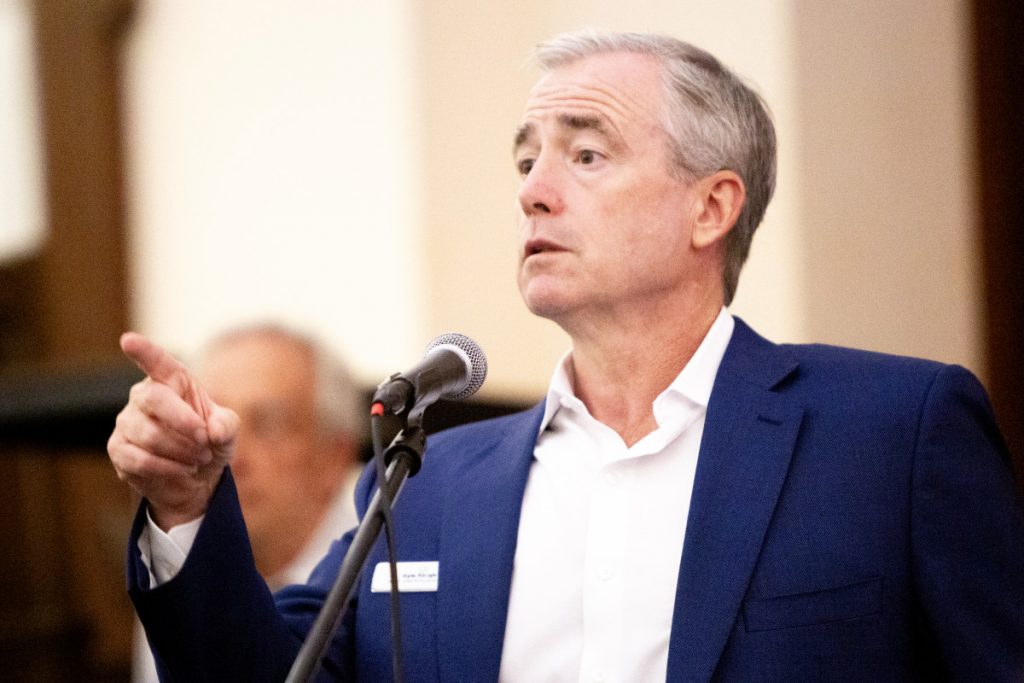
The first area of potential budget cuts discussed was the evening entertainment series. Keogh outlined which days of the week were reserved for in-house programming and which were reserved for outside programming. Tuesdays, Thursdays and Saturdays are reserved for the Chautauqua Symphony Orchestra and Mondays are reserved for the Music School Festival Orchestra, while Wednesdays — the most costly day of programming, currently — are reserved for emerging artists and Fridays are set aside for the Popular Entertainment Series.
Keogh explained that student programming is an invaluable part of the evening entertainment series because it is simultaneously low-cost for the Institution and provides performance experience to students.
“It gives tremendous value to students as part of their education,” Keogh said.
Friday evenings tend to bring the most notable artists and, as such, typically either break even financially or make a profit, not including the ancillary profit of related revenus streams like parking and food and beverage sales at the Athenaeum Hotel and 3 Taps, according to Keogh.
He noted that Wednesday evening programming presents a financial issue and may see changes in the 2026 season. He said he believes that there could be changes to maximize the impact of evening entertainment and specifically referenced Thursdays as an opportunity for growth.
“Thursday, we probably could do more with,” he said.
Community member Steve Brown suggested focusing on filling the Amphitheater as a means to gain revenue, specifically referencing jazz-pop singer Laufey’s performances alongside the CSO on Aug. 2 and 3.
While Keogh stated filling the Amp is needed, he said the Institution faced unprecedented issues with Laufey’s performances.
“It was the first time that we’ve ever had ticket brokers come after us,” Keogh said. “The bots hit us pretty hard, and that’s where we thought sales were through the roof on Saturday, and they were sold very well. … But that’s the way that Madison Square Garden and all these other things sell out in minutes, is because the ticket brokers come in with sophisticated systems and buy up all those tickets.”
Keogh also said the Interfaith Lecture Series may see programmatic or presentation changes, primarily to be more aligned with the Chautauqua Lecture Series.
“I think we’re going to try and think about some tweaks to Interfaith,” Keogh said. “We probably wouldn’t get rid of it, but try some experiments around that strategically — like, sometimes, should (the afternoon and morning lectures) be more lined up?”
The next subject of the meeting was The Chautauquan Daily. With a current deficit of $170,000, Keogh said during the July 28 webinar that the Institution hoped to close that budget gap.
On Monday, Keogh discussed the rising cost of both printing and of hiring interns, as well as the decrease in advertising revenue. Community members suggested varying ideas ranging from charging for the digital version of the Daily to decreasing its publication frequency to endowing reporterships.
Community member Ruth Nelson mentioned the idea of switching the Daily online for weekday editions and having physical copies for the weekend paper only. While some community members were in support of the reduced frequency of physical copies, others pushed back, citing the physical paper as a community resource.
One attendee, who did not state her name, stressed the importance of a physical newspaper as a way of recordkeeping.
“I have articles for my kids who played baseball or been in the area. I love having those stuck on the walls,” she said. “… I would hate to see it disbanded altogether, and I think it provides an important place for us to hear about the sports, obituaries, celebrations, activities. I would hate to see that go.”
One individual, who did not state her name, said she rents to people visiting for shorter periods and spoke about the impact it has on her renters, who typically come to Chautauqua for one to two weeks.
“My renters especially look forward to it and plan their day because they’re not as familiar,” she said.
Keogh said this was the area where he received the most feedback. He noted receiving emails from former interns who said the experience helped their career trajectories. Keogh gave two ways the Daily may have to change: pricing and subscription structure.
“We probably need to raise the price fairly substantially and probably sell it right at the moment when you actually get your gate pass,” he said.
Another prominent area of discussion was the housing shortage on the grounds. During the July 28 webinar, Keogh said the cost of on-grounds employee housing is nearly $900,000 for 101 staff bedrooms.
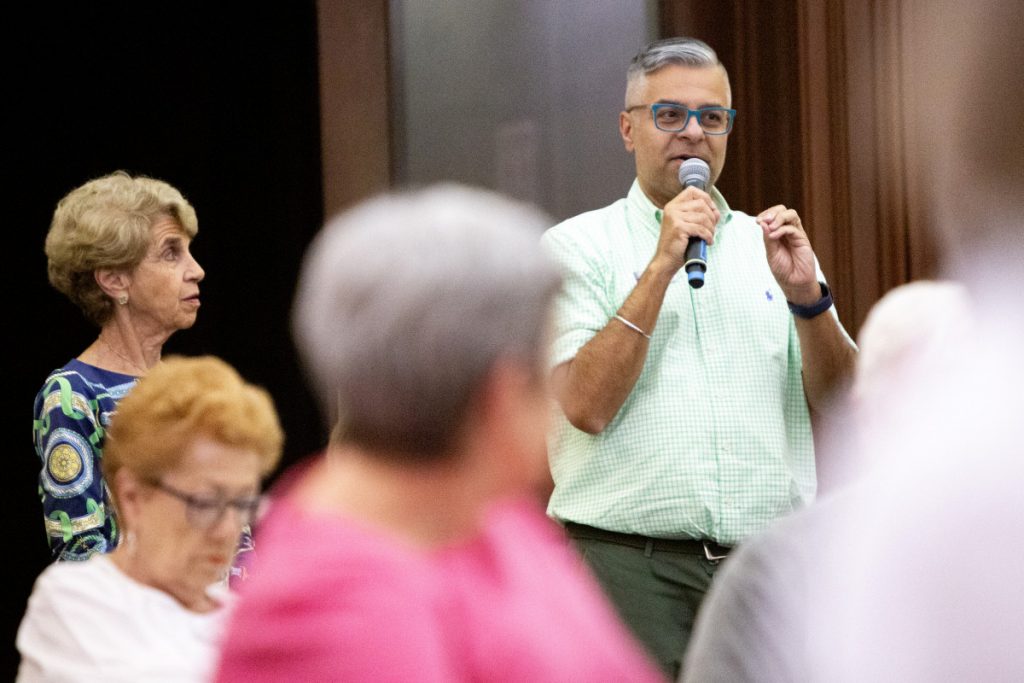
“We got hit when minimum wage went up 30% from 2019 to 2025 — that’s above inflation,” he said. “Other areas hit us pretty hard, but the biggest impact, far and away, is the cost of real estate.”
He noted that, because of the increase in pricing, it has become increasingly more difficult to find housing on the grounds.
“We are fairly near-capacity in terms of what we use, and we have declining capacity on housing, which is, many people buy a house — like we used to have a lot of boarding houses, rooming houses, they get sold off — they turn into single family homes,” Keogh said. “What was 20 beds is now six.”
According to Keogh, some of this comes with the refusal of homeowners to rent out their properties during the weeks they aren’t on the grounds.
“We’ve got to add some housing,” he said. “… It’s an important part of what we need to do.”
He suggested the expansion of denominational houses as one of many needed solutions.
Another market the Institution seeks to expand in order to increase revenue is food and beverage profits on the grounds. Keogh said the Institution seeks to sell alcohol inside the Amp during popular entertainment performances in the 2026 season, given the success of venues like the Athenaeum Lobby Lounge, 3 Taps and Afterwords Wine Bar.
“We didn’t know how people would react to a bar in the Athenaeum, whether they would look at that and say, ‘Oh my god, the Women’s Christian Temperance Union movement had a house 200 yards away,’ ” Keogh joked. “Most people walked in and said, ‘OK, I’ll have a martini,’ and they continued on.”
Keogh specifically referenced a conversation he had with former Kennedy Center president Deborah Rutter, who delivered the morning lecture on July 11.
“I sat and had dinner next to the woman who ran the Kennedy Center, who you saw speak. I said, ‘We’re thinking about putting alcohol in there.’ She’s like, ‘It is a massive line item in the Kennedy budget. Shows do not work unless you have alcohol sales. The economics get better, and the customer experience gets better,’ ” Keogh said. “We want to do that next year.”
Keogh explained the implementation of alcohol on the grounds is a major draw for one-week and one-night attendees, especially when coming in for a Friday night concert.
Another topic of debate during the meeting was the changes proposed to season ticket prices. Keogh and the board’s Financial Sustainability Working Group have been examining potential cost structures to bring the season ticket cost into better alignment with the weeklong ticket cost.
Keogh said that for a per-week basis, a season ticket essentially gives buyers a 50% discount compared to a single week. Keogh looks to potentially bring this down to 30%.
“Each year, we are uncertain as to whether the revenues that come in through gate ticket sales and ancillary revenues and philanthropy will cover the costs that we have committed to you, either historically, because of all the fixed costs associated with the physical plant, or on a year-to-year basis, because we commit to programmatic expenditures before we’ve sold any gate passes,” said Timothy Renjilian, chair of the Chautauqua Foundation Board of Directors.
Renjilian said he believes that a larger part of the overall $50 million budget should come from endowments “in order to take that risk off the table.”
The current endowment affords $5 million annually to the Institution for operational costs, though many gifts to the Institution have not yet been realized. Renjilian encouraged Chautauquans to consider establishing or contributing to endowments to secure the future of specific programs at the Institution.
“I will tell you that at the Foundation, one of our commitments and goals is to have a new president coming in in the next year or so, and we will then begin the planning for the next capital campaign, which is to make sure that endowment is a big part of that conversation,” Renjilian said. “We’re really thinking going forward about how important that is.”
To close the meeting, Keogh stressed the importance of Chautauquans considering how they might contribute financially to programmatic endowments to support the causes they care about.
“If you have the resources, please find a way to help,” Keogh said. “If you don’t have the resources, find a way to spend time or talent and say, ‘Here’s how I can help in these areas.’ It’s an important place, and we can all contribute.”
Keogh and members of the Financial Sustainability Working Group will hold two more sessions through Forum Dialogues this season, at 3:30 p.m. Monday, Aug. 11, and 3:30 p.m. Monday, Aug. 18, in the Hall of Christ.


